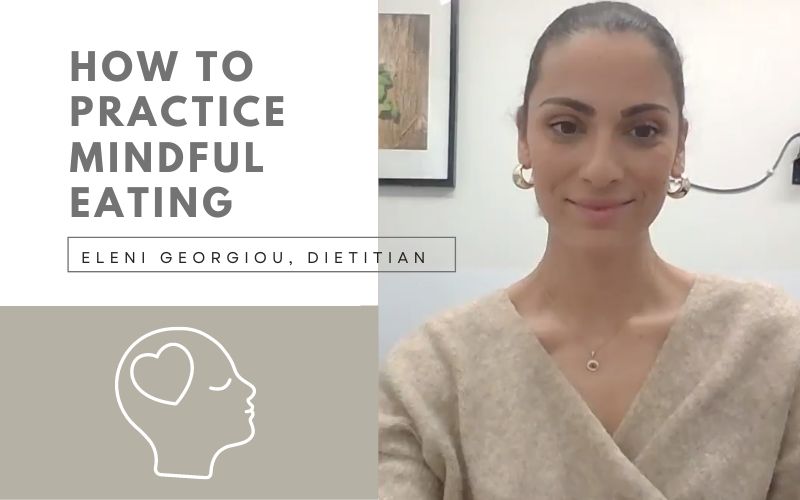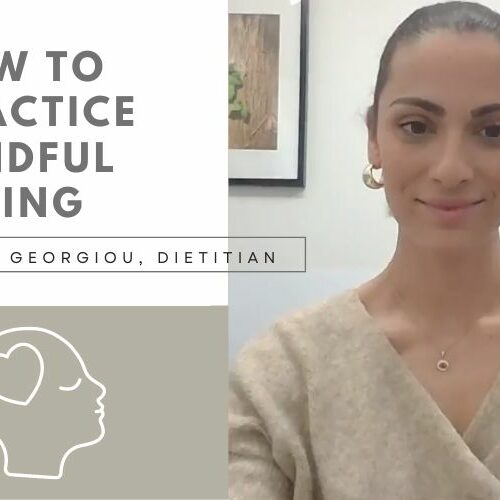
Have you heard about mindful eating, and wonder what it involves? It’s a topic I’m pretty passionate about. Learning how to practice mindful eating has a multitude of benefits. Mindful eating strategies help with those who struggle with emotional eating, stress eating, boredom eating, and even binge eating. And I’m sure everyone can relate to at least one of those. It can also play a role in reducing stress both before and after eating, which can help to improve our gut health, and in turn, the gut-brain axis. Another hot topic you may have heard about more often lately.
So what are the benefits, and how do we actually practice mindful eating? Hit play on my latest video, or keep reading below, to find out.
What is mindful eating?
Let’s start by defining mindfulness. Mindfulness is a focus on one’s thoughts, emotions, and physical sensation. In that moment, it helps us to become more aware of a situation rather than just reacting to a situational choice. So therefore, eating mindfully means that we are using all of our senses to experience and enjoy the food choices you make. Attention is being paid to the foods that are chosen, the reasons why you’re choosing that food and the responses to that food. So there are a few levels to it.
How to practice mindful eating before we put food in our mouths.
Learning how to practice mindful eating starts well before we eat, by first determining if it actually is time to eat. We begin by understanding if our body is telling us we are hungry, or whether there is another reason we may be looking for food. Here are some things to check in with:
- Is your stomach growling?
- Are you feeling low in energy?
- Has it been more than two to three hours since your last meal or snack?
Then those are your physical hunger cues that are telling you to eat. So in that case, we can grab an appropriate meal or snack.
On reflection, if we find that those cues aren’t there, then we need to take control. Perhaps you just had a stressful situation, or you might be feeling emotional or even just bored. It’s great to be aware that food is just a distraction in this case. So when we experience this awareness, we can replace eating with something else, Maybe reading a book, calling a friend, watching a quick video, or anything that distracts you from that initial reaction and connects to the real feeling you’ve become aware of.
4 tips for eating mindfully
Once we’ve determined that yes, it is hunger cues at play. we should take steps to help us eat more mindfully. This will help us eat less, eat better quality food, digest our food more effectively, and importantly, actually enjoy what’s in front of us. Here are four practical ways to do that:
- Always eat on a plate where we can. Avoid eating out of packets as more often than not, we end up overeating. And before we know it, the packet is empty.
- Remove distractions. Enable yourself to use your senses to enjoy the meal. What does it taste like? What’s the texture like? Look at the colors. What combinations do you have on your plate? This will increase your satisfaction from the meal.
- Wait 10 minutes until looking for your second portion. One we’ve all heard before. This allows your stomach time to tell your brain that it’s actually full.
- Take smaller bites and slow down. We are all busy and before we know it, we are left with 10 minutes to scoff down our lunch, and we really need to take our time again to increase the satisfaction we feel from that meal.
So take note of the level of mindful eating that you need to focus on. I guarantee you, you’ll enjoy your food that much more.

Mindful eating can help the gut-brain axis
Have you ever noticed that you get really nervous, you get butterflies for a big event or your stomach starts turning and becomes really uncomfortable? Or maybe you run to the bathroom when you’re in a nervous or quite highly anxious situation? This is all thanks to our gut brain axis. Gaining control over how our brain tells our gut to react is a key component of good gut health. I see so many times in practice where gut is traveling along beautifully until a really stressful time and it almost feels like we’re back at square one.
So it stands to reason that stressed eating can impact our digestion! What we eat supports the gut-brain connection, but what also supports it, is the way we eat. Practicing mindfulness, to bring a sense of calm and choice while we eat, can have a positive impact on our gut, and in turn, our brain. Mindful eating practice changes the types of food we eat, and the way we feel when we eat them. It is incredibly helpful to practice over time to help support a better gut-brain connection
Learn more about mindful eating at the Gut-Brain Axis Seminar
If you’d like to know more, I’ll be presenting on mood and food and mindful eating, at our next event, the Gut-brain Axis Seminar. Find out exactly how the gut-brain axis works and learn some powerful techniques that can help. In this seminar and 2-course banquet at Nostimo Restaurant Greek Club, Brisbane, we’ll show you how to reprogram the signals sent by this nerve via exercise, psychology and nutrition. Other presentations include:
- Balancing the gut microbiome as a key influence in gut-brain axis – Desi Carlos, Dietitian & Nutritionist.
- Role of exercise in gut-brain axis including vagal nerve stimulation and release of neurotransmitters – Jade Kubler, Exercise Physiologist..
- Psychology of gut-brain connection and practical tips for taking control of the autonomic nervous system and vagus nerve pathways – Mette Parkinson Gilligan, Psychologist.
DISCLAIMER:
The content in this article is not intended as medical advice. It is also of a general nature and is not tailored to your individual circumstances. If you are experiencing significant digestive symptoms, a 1:1 consultation is always the best approach. Please contact our clinic to discuss your unique situation and our tailored and individualised IBS protocol.




